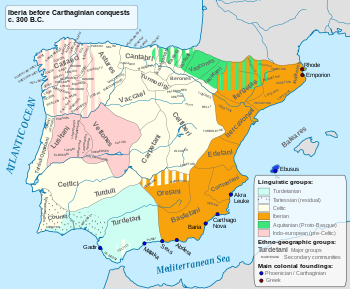The Bardili were a small, pre-Roman tribe of the Iberian Peninsula, and an offshoot of the widespread Turduli people, who lived in what is now southwestern Portugal in the 5th-1st centuries BC.

Location
Migrating in conjunction with the Celtici,[1][2][3] they settled the present Setúbal peninsula along the Tagus river mouth and the lower Sardum[4] (Sado; Kallipos in the Greek sources[5]) river valley around the 5th Century BC, where they founded several coastal towns. The exact location of the Bardili capital Bardo remains uncertain, though the towns of Equabona/Aquabona (Coina-a-Velha), Caetobriga/Cetobriga (Monte da Rotura, near Setúbal) and Salacia (Alcácer do Sal; Iberian-type mint: Ketuvion) have all been identified.[6]
History
In the mid-3rd century BC the Bardili were forced to acknowledge the suzerainty of Carthage at the latter part of the century. However, their history after the Second Punic War is unclear; they seem to have played no role in the Lusitanian Wars and subsequent conflicts during the 2nd-1st Centuries BC. It is almost certain that the Bardili recovered their independence, which they enjoyed for nearly a century before being included into Hispania Ulterior province by the Praetor Publius Licinius Crassus in the wake of his campaign against the Lusitani and Celtici in 93 BC.[7] Later during the Sertorian Wars in 79 BC, Proconsul Quintus Caecilius Metellus Pius established a permanent military base at Caeciliana (near Setúbal), in order to prevent the Bardili from lending their support to Quintus Sertorius.[8]
Romanization
Increasingly Romanized after the Ulterior Propraetor Julius Caesar campaigns against the Lusitani, Turduli Oppidani, and Turduli Veteres in 61-60 BC,[9] they were aggregated to the new Lusitania province by Emperor Augustus in 27-13 BC.
See also
Notes
References
External links
- Berrocal-Rangel, Luis (2005). "The Celts of the Southwestern Iberian Peninsula". e-Keltoi: Journal of Interdisciplinary Celtic Studies. 6: 481–96.